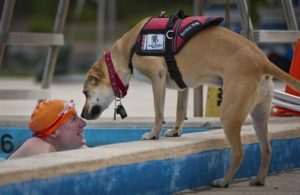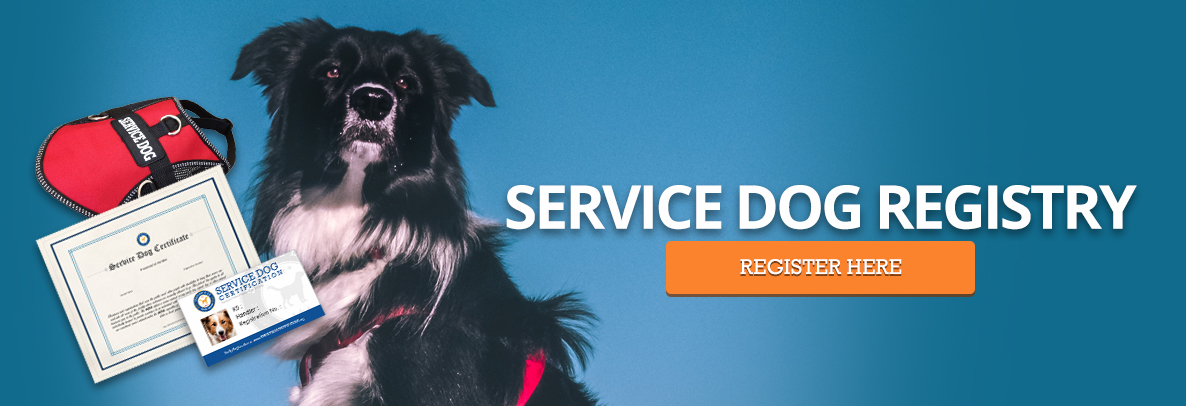Home Page › Blog › Texas Service Dog Laws
Texas Service Dog Laws

Individuals with disabilities whether they are physical or mental often feel isolated because it is harder for them to function in public; this is where service dogs come in. Service dogs provide individuals with disabilities the ability to have more freedom and go out in public without having to worry about what to do if they need help. For example an individual who is blind may find it difficult to walk down the street as there may be unexpected obstacles or they may fear to cross the street, with the aid of a service dog an individual who is blind can navigate any street because their service dog becomes their vision and can help them around obstacles and help them cross streets safely. Individuals suffering from seizures may be afraid to go out into public for fear of having a seizure and being alone and injuring themselves or not getting the help they need, with the aid of a service dog that can alert the individual to a seizure they can prepare themselves to avoid injury and the service dog can keep them safe during the seizure and get help after the seizure. Service dogs are a great way for individuals with disabilities to be able to go out into public and lead normal lives instead of being isolated at home. It is important to understand what service dogs are and the rights that individuals with disabilities have regarding the use of service dogs.
What is a Service Dog
According to the Americans with Disabilities Act (ADA) a service dog is defined as a dog that is specially trained to help individuals with disabilities.
Types of Service Dogs
 Service dogs help individuals with disabilities perform tasks they would not be able to on their own. Service dogs help individuals with different disabilities including physical, neurological, and mental health. It is important to not make assumptions, just because a person’s disability is not visible like people who suffer from seizures it does not mean that they are not disabled. The same can be said about service dogs as there are several breeds of service dogs that people without disabilities may not be aware of. Below is a list of the different types of service dogs:
Service dogs help individuals with disabilities perform tasks they would not be able to on their own. Service dogs help individuals with different disabilities including physical, neurological, and mental health. It is important to not make assumptions, just because a person’s disability is not visible like people who suffer from seizures it does not mean that they are not disabled. The same can be said about service dogs as there are several breeds of service dogs that people without disabilities may not be aware of. Below is a list of the different types of service dogs:
- Guide Dogs- Guide dogs help individuals who are visually impaired or blind and they will help guide them around obstacles and with tasks like crossing streets.
- Hearing Dogs- Hearing dogs help individuals with varying degrees of hearing impairments and alert them to sounds like doorbells, alarms, smoke alarm, telephone, or oven buzzer.
- Mobility Assistance Dogs- Mobility assistance dogs help individuals who have mobility issues like brain injuries, spinal cord injuries, muscular dystrophy, and arthritis by bringing them objects and pressing buttons like those in an elevator. Some mobility dogs are even strong enough to pull a wheelchair up a ramp.
- Diabetic Alert Dogs- Diabetic alert dogs help the individual by alerting them when they smell changes in the individual’s blood sugar. When an individual’s blood sugar is either hypoglycemic or hyperglycemic there are scent changes that humans are not capable of smelling but dogs with their acute sense of smell can pick up on them and alert the individual.
- Seizure Alert Dogs- Seizure alert dogs help an individual who is prone to seizures by alerting them when they sense changes in it the individual’s behavior before a seizure.
- Seizure Response Dogs-Seizure response dogs help the individual who is prone to seizure by barking or pressing an alarm to get aid for the individual and they also have the ability to keep the individual safe during the seizure and then help them after the seizure. These dogs are not capable of sensing a seizure, but they can assist during and after a seizure.
- Psychiatric Service Dogs- Psychiatric service dogs help individuals who are suffering from post-traumatic stress disorder, anxiety, or depression by helping the individual feel safer and calmer in public helping them feel less overwhelmed when out in public.
- Autism Support Dogs- Autism support dogs help children who are on the autism spectrum by reducing the isolation these kids feel due to their difficulty in social settings and interacting with others.
- FASD Service Dogs- Fetal Alcohol Service Dogs (FASD) help children who were exposed to alcohol during fetal development as they often have physical, mental, behavioral, and learning problems.
While it is common to see German Shepherds and Labrador Retrievers as service dogs, it is important to note that the breeds of service dogs are just as varied as the disabilities of the individual who require their aid. It is not uncommon for poodles, Pomeranians, golden retrievers, poodles, cocker spaniels, Chihuahuas, etc. to also be service dogs. It depends on the disability they are required for. While larger breeds like shepherds and retrievers may be required for physical or vision disabilities, the smaller breeds like poodles and Chihuahuas make excellent hearing dogs. It is important to not make assumptions when it comes to service dogs as you don’t want to offend the disabled individual who requires their service.
Service Dog Laws
Under the Americans with Disabilities Act (ADA), the Federal Government has established guidelines regarding the definition of a service dog and what rights individuals have regarding their service dogs. In compliance with ADA, the Federal Government states that “State and local governments, businesses, and nonprofit organizations that serve the public generally must allow service animals to accompany people with disabilities in all areas of the facility where the public is allowed to go (ADA Requirements)”. The law further states that business owners may only ask individuals with service dogs two questions regarding their service animal and they include asking if the service dog is required due to a disability and what the service dog is trained to do. Owners and employees may not ask about the individual disability and they may not request any type of identification or certification regarding the service dog or medical documentation from the disabled individual. While covered by the Federal Government, many states have their own laws and guidelines regarding service dogs.
Texas Service Dog Laws
The state of Texas defines a service dog as a dog that has been specially trained to assist a disabled individual and is used by the disabled individual. Texas defines a disability as:
- Visual impairment
- Speech impairment
- Hearing impairment
- Mental disability
- Physical disability
- Post-traumatic stress disorder (PTSD)
- Developmental or intellectual disability
Under Texas law, dogs that are considered to be emotional support dogs are not considered service dogs as they are not specially trained and therefore are not covered by the same rights as service dogs.
Texas law also states that individuals with disabilities have the right to bring their service animals on public transportation, and they are not required to pay an extra fare for the service dog and the individual and their service dog may not be separated. Texas law states that individuals with disabilities have the right to bring their service animals into all public accommodations. Examples of public accommodations include the following:
- Restaurants
- Hotels
- Public transportation terminals
- Auditoriums and convention centers
- Theaters and sports stadiums
- Schools
- Zoos and parks
- Gyms and bowling alleys
- Libraries and museums
- Hospitals
Housing
An individual with a disability that requires the aid of a service dog may not be denied housing even if the property has a no animals allowed policy. If a property refuses to rent or lease housing to an individual because they require a service dog they are in violation of the law.
Service Animal User’s Responsibilities
While disabled individuals who require a service dog are protected under the law, they have responsibilities that they have to adhere to as well. When using a service dog in public they must always be under control with either a harness or a leash and if the individual refuses to do so they can be removed. Individuals who have service dogs are also responsible for any damages caused by their service animal.
Penalties for Violating Service Animal Laws
Disabled individuals who require the aid of a service dog are protected under the law and if they are denied the right to public access then the person, business, or organization will be guilty of a misdemeanor that is punishable by a fine of up to $300 and 30 hours of community service. Because the disabled individual’s rights have been violated they also have the right to go to court and sue for damages.
Conclusion
The use of service dogs provides disabled individuals the opportunity to go out into public and lead normal lives. Service dogs help to eliminate the isolation that disabled individual may feel by aiding them with everyday tasks that able-bodied individuals take for granted. Disabled individuals who require service dogs are protected under the law and may not be denied access to public areas or public transportation and if they are there are punishable by monetary fines and community service.
About the Author: The writing team at Service Dog Certifications is made up of folks who really know their stuff when it comes to disability laws and assistance animals. Many of our writers and editors have service dogs themselves and share insights from their own experiences. All of us have a passion for disability rights and animals.
25 comments
Leave a Reply Cancel reply
Latest Posts

How to Bring a Service Dog to Disneyland
Trained service dogs are more than welcome to join their handlers at Disneyland. In this guide, we’ll explain Disneyland’s policies and give practical advice for bringing a service dog to Disneyland for the first time. Disneyland’s Service Dog Policies The Magic Kingdom is happy to welcome trained service dogs across most park locations! They kindly […]

Read More

Can Dogs Eat Tomatoes?
Yes! Dogs can safely enjoy tomatoes, but there are a few risks to be aware of so you can feed your dog responsibly. Fully ripe tomatoes (without the stems and leaves) can actually have nutrients that are good for your pup. Tomatoes have chlorogenic acid, an antioxidant that can have anti-inflammatory effects in cells. They’re […]

Read More

Can a Primary Care Doctor Write an ESA Letter?
Your family doctor, also called a primary care physician (PCP), can write a letter recommending an emotional support animal. We’ll explain what legally gives them that ability and explore what better options might be available for you. Why are Physicians Able to Write an ESA Letter? To turn your pet into an emotional support animal, […]

Read More







I was in a restaurant yesterday evening and someone brought in a dog and claimed it as a service dog. The dog was clearly untrained. Spent the majority of the time chewing on a bone, barking and then it was jumping on other guests. What is the stop someone from deceptively saying their dog as a service animal?
Does anyone know the laws for Service Dogs in Training? I have heard that SDiT’s are allowed the same legal coverages of trained SD’s.
Service animals in training are not afforded the same rights as legal service dogs. There is nothing that can be done if you are not following the law properly.
This is all good and Dandy but what about my child who suffers from seisure’s and stress because of their fears of dogs or animals. I have a child who is so scared of even the smallest dog that I have a hard time taking them out to eat in fear of someone having their dog in public. What about our rights? I have no problem with a blind person with a dog. Other than that, your rights to a dog in public are infringing on mine. PERIOD!!!! Most of these service dog are from dog lovers who dont want to leave their precious little dog at home. PERIOD!!!!!
Actually them having a service animal is not infringing on any of your rights. Those requiring a trained service animal to help mitigate a disability have just as much right to have their service animal with them as you have to go out in public.All true service animals are considered an essential piece of medical equipment. How would you feel if say you had a prosthetic leg and someone had a severe phobia of prosthesis, would you give up your prosthetic leg to make that person more comfortable? Because as you stated you are infringing on their rights to be in a public place because your prosthesis is prohibiting them from enjoying their outing. See how that works? I would never ask a disabled person to give up a medical device that helps them gain independence just to make me feel more comfortable. And that goes for properly trained service dogs.
If a dog is pulling on the leash, the person allows dog to be approached and petted, can hotel staff then ask for certification that the dog is a service dog?